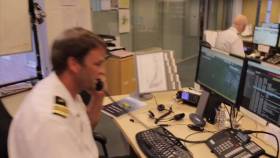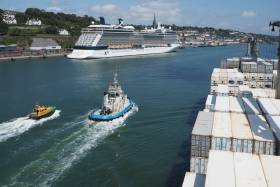Displaying items by tag: Minister Ross
Shane Ross, the Minister for Transport, Tourism and Sport has published a new National Search and Rescue Plan aimed at placing Ireland at the forefront of international best practice.
The plan also addresses some key lessons arising from tragic accidents involving Search and Rescue services in Ireland over the last three years. The new plan replaces the existing National Maritime SAR Framework dating from 2010. It will be the baseline guide for all Search and Rescue (SAR) organisations in Ireland. It underpins agreed methods of coordinating and conducting all SAR activities in Ireland and provides for a robust governance and oversight regime for SAR into the future.
Minister Ross said: “This review and the resulting National SAR Plan is about significantly improving the manner in which the State provides and oversees Search and Rescue. Ultimately, our objective is to make our SAR service better and safer for all those involved and ensure that we have clear guidelines and practice for those who have vital roles and responsibilities to fulfil.”
The Minister continued: “This new plan takes account of the recommendations arising from a succession of Reports and Reviews in relation to Search and Rescue in Ireland over the last year, including the AAIU’s Interim Statement (March 2018), the AQE Report on a “Review of Oversight of Search and Rescue (SAR) Aviation Operations in Ireland” (September 2018) and the Marine Casualty Investigation Board Report (MCIB) into the fatal accident in Kilkee involving a Coast Guard volunteer (December 2018).”
He said: “It is vital that we learn the lessons from tragic accidents such as Kilkee and Blacksod and that we nurture and promote a world class Search and Rescue service.”
A key conclusion of the SAR review, which underpins the new National SAR Plan (NSP), is that roles, responsibilities and inter-dependencies within the overall SAR system need to be clear, explicit and understood by all those concerned. A new Governance and Oversight chapter in the plan sets out these roles very clearly, from strategic, tactical through to operational levels. It also recommends SAR stakeholders meet at least annually to review the plan.
The NSP delivers on a new mechanism of assurance in relation to standards and practices and oversight of the overall SAR system. This will include the creation of a support network to assist those involved in search and rescue to develop minimum standards and practices and to embed principles of continuous improvement and safety within their organisations. It also creates a new SAR Regulators’ Forum, a unique initiative which brings transport regulators in the Search and Rescue domain together to exchange good practice and seek to improve the overall system assurance mechanisms.
A new National SAR Committee has been created with renewed terms of reference which underpins its role in providing strategic coordination, guidance and leadership for Search and Rescue. This group will monitor the performance and adequacy of the SAR system and advise on any necessary improvements. It will be chaired by Sir Alan Massey – ex CEO of the UK’s Maritime and Coastguard Agency. Its members will include senior representatives from the Coast Guard (IRCG), Irish Aviation Authority (IAA) and An Garda Síochána (AGS), their parent Departments and other strategic partners in both the State (Departments of Defence, Health and Local Government) and the voluntary SAR sector (RNLI).
The SAR Review report also includes an implementation plan for a new “virtual” Joint Rescue Coordination Centre (JRCC) model. This was another key recommendation in the AQE Report. The new model will secure additional collaboration between the Aviation Rescue Coordination Centre (ARCC), which is managed by the IAA, and Marine Rescue Coordination Centre (MRCC), which is managed by the Coast Guard. This will greatly enhance the overall SAR system. Utilising enhanced technologies and greater collaboration, the new JRCC will capitalise on the strengths of the current Aeronautical RCC and Maritime RCCs and ensure a more coherent response.
With regard to Marine Casualty Investigation Board (MCIB) recommendations included in the review process, the new Search and Rescue Plan acknowledges the on-going work of the Irish Coast Guard (IRCG) in developing an accredited safety management system. The IRCG’s new Standard Operating Procedures and guidance material relevant to the MCIB report were subject to international peer review (involving Canada, New Zealand and Sweden) and are being modified to reflect best practice in relation to boat launching and the transition from search and rescue to search and recovery phase of IRCG operations.
In conclusion, Minister Ross said: “I would like to convey my thanks to those Departments and agencies who participated in the review process. I would particularly like to thanks Sir Alan Massey for his leadership and expertise through this seven month review process. I am very pleased with what has been achieved in such an ambitious timeframe since the publication of the AQE Report. We must now endeavour to build on this momentum and the ambition in this report which is to make Ireland’s SAR service “best in class” internationally – and in doing so, honour the memory of those who have lost their lives in the service of others.”
#cruiseliners - Independent.ie reports in a reduction in the number of cruise ships entering Dublin Port will cause considerable damage to the tourism sector on the island of Ireland, the leader of the DUP has warned.
It is understood that Arlene Foster has been in contact with transport minister Shane Ross to outline the impact that reduced cruises will have on both sides of the border. Foster fears that companies may now go elsewhere.
It follows news that the Dublin Port Company was considering curtailing its cruise business in order to make way for more freight after Brexit. Business groups have heavily lobbied against the port's decision insisting it could heavily damage businesses in the city.
More on the story here.
#cruiseliners - The Port of Cork writes the Irish Examiner, is expected to take advantage of a lack of space in Dublin Port for large cruise ships when Brexit forces authorities in the capital to handle increased amounts of freight and cargo.
Transport Minister Shane Ross described a decision by Dublin Port to significantly reduce its intake of cruise ships in the next two years as a “temporary blip”.
But the port's decision has triggered frustration among tourism services and cruise companies, especially if the €50m annual industry is damaged.
In the Dáil, Mr Ross said he was keen to reduce any adverse impacts on tourism.
He said Dublin Port authorities had briefed him about its priorities for Brexit and the need for extra cargo space.
“Given space constraints, it was explained that cruise berths will have to be limited for a period from 2021 onwards to allow this construction work to take place, while ensuring the port can continue to handle large cargo volumes,” the minister explained.
The newspaper has more on the topic here.
Minister Ross Under Fire for Leaving it Late to Outline Ports' Brexit Contingency Plans
#irishports - The Minister for Transport Shane Ross writes Independent.ie is under fire over the readiness of the country's main ports to cope in the event of a no-deal Brexit.
Documents released to Fianna Fáil's Robert Troy under Freedom of Information show that the Department of Transport, Tourism and Sport (DTTAS) only requested an outline of a contingency plan on November 15 last from Dublin and Rosslare ports.
Concern relating to how a crash-out Brexit would affect Dublin Port in particular is evident in the correspondence. Rosslare was asked if there was capacity for it to help out if Dublin Port runs into delays, while Dublin was asked to outline the potential for problems with trade, traffic and delays.
A deadline of November 23 was given to both ports to return the outline plan - just 18 weeks before Britain's scheduled leave date.
For more on the story including traffic plans to and from the Welsh port of Holyhead click here
Delay In transfer of Dun Laoghaire Harbour Company to Council ‘Not Satisfactory’ - Ross
#PortTransfer - Minister for Transport Shane Ross has said the transfer of the Dún Laoghaire Harbour Company to local authority control is taking too long, writes The Irish Times.
“Dún Laoghaire is certainly the slowest of these ports that will be taken into local authority control,’’ Mr Ross said.
“I accept the delay in decision-making and progress in any direction is not satisfactory.’’
The company, which is the State enterprise responsible for the maintenance and development of the harbour, is to be transferred to the control of Dún Laoghaire-Rathdown County Council under the Harbours Act 2015.
Mr Ross said the council had commissioned consultants to conduct the “due diligence’’ of the company and had recently forwarded a draft report for the company’s consideration.
He said he also understood both sides had established transitional teams to work on the practical issues associated with the transfer.
Mr Ross was responding to a strongly-worded attack on the company in the Dáil by Dún Laoghaire AAA-PBP TD Richard Boyd Barrrett.
For more on the port transfer story, click here

































































